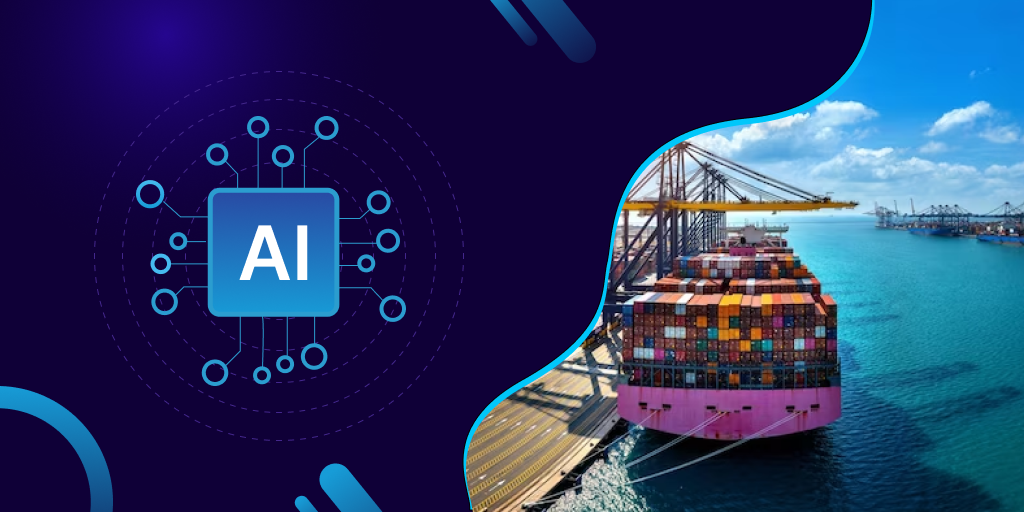In today’s dynamic supply chain management landscape, integrating cutting-edge technologies has become essential. Artificial Intelligence (AI) and Analytics are emerging as transformative tools, offering unparalleled opportunities for optimization and innovation. According to the NASSCOM community, the global AI in the supply chain market is projected to reach USD 20 billion by 2028, growing at a CAGR of 20.5%. This surge reflects the increasing recognition of AI’s benefits in supply chain management. This article explores how businesses can leverage AI and Analytics to build smarter, more adaptable supply chains.
How are AI and Analytics transforming supply chains?
AI and analytics are playing a significant role in transforming supply chains across various industries. Here are key ways they’re making an impact:
- Demand Forecasting and Inventory Optimizations: AI algorithms enhance accuracy by analyzing historical and real-time data for precise demand forecasting. Retail giants like Amazon leverage AI to adjust inventory, minimizing stockouts or overstocking and ensuring streamlined operations.
- Logistics and Transportation Optimizations: Real-time data analysis aids in identifying optimal routes, modes, and schedules, exemplified by companies like UPS optimizing delivery routes with AI, resulting in reduced costs and enhanced logistics efficiency.
- Proactive Issue Resolution and Supply Chain Resilience: AI's predictive capabilities enable proactive issue resolution, anticipating disruptions and enhancing supply chain resilience. This approach ensures continuity even in the face of unforeseen events, such as predicting supplier issues or natural disasters.
- Predictive Maintenance for Equipment Reliability: AI predicts equipment maintenance needs, reducing downtime, lowering maintenance costs, and extending equipment lifespan. For example, AI monitors manufacturing machinery's health, predicting maintenance requirements to prevent unexpected breakdowns.
- Customer-Centric Supply Chain Management: AI analyses customer behaviour, preferences, and feedback, enabling businesses to tailor supply chain processes for timely deliveries and personalised experiences. E-commerce platforms use AI for personalised recommendations, enhancing customer satisfaction.

How can AI and Analytics be integrated into supply chains?
Integration of AI and Analytics into supply chains requires a thoughtful and strategic approach. Here are key integration strategies to ensure seamless implementation:
- Data Integration: Create a unified data platform by integrating data from diverse sources such as ERP systems, IoT devices, and external databases. A consolidated dataset provides a comprehensive view of AI and Analytics applications.
- Cross-functional collaboration: Facilitate collaboration between departments like logistics, procurement, and finance. Cross-functional teams can work together to leverage AI and Analytics insights for a holistic supply chain approach.
- Cloud-Based Solutions: Embrace cloud-based solutions for AI and Analytics to enhance scalability and accessibility. Cloud platforms provide the flexibility to scale resources based on demand and facilitate remote access to insights.
- Real-Time Data Processing: Implement real-time data processing capabilities to enable timely decision-making. This is particularly crucial for applications like demand forecasting and inventory management.
- API Integration: Integrate AI and Analytics solutions seamlessly with existing supply chain management systems using Application Programming Interfaces (APIs). This ensures compatibility and enables the flow of information between different software components.
- Legacy System Compatibility: Assess the compatibility of AI and Analytics solutions with existing legacy systems. Implement solutions that can integrate smoothly with legacy technologies to minimise disruption during the transition.
- Scalability Considerations: Choose AI and Analytics solutions that can scale with the growing demands of the supply chain. Scalable infrastructure ensures that the technology remains effective as the business expands.
- User-Friendly Interfaces: Develop user-friendly interfaces for AI and Analytics tools to ensure that end-users, including non-technical staff, can easily interpret and utilise the insights generated.
- Security Measures: Implement robust security measures to protect sensitive data. This includes encryption, access controls, and adherence to industry standards to maintain the integrity and confidentiality of supply chain information.
- Feedback Loops: Create feedback loops for collecting insights from end-users and stakeholders. This information can be used to continuously improve the integration of AI and Analytics into the supply chain.
- Collaboration with Technology Partners: Collaborate with technology vendors and partners who specialise in AI and Analytics for supply chain management. Engaging with experts can streamline the integration process and ensure optimal results.
- Pilot Programmes: Initiate small-scale pilot programs to test the integration of AI and Analytics in specific segments of the supply chain. Pilot programs allow for real-world testing and help identify potential challenges before full-scale implementation.
What are the challenges and opportunities for AI and Analytics in the supply chain?
Amidst rising AI adoption in supply chains, businesses face challenges and opportunities. Here are how to strategies to leverage AI effectively:
Challenges:
Data Quality:
- Challenge: The effectiveness of AI and analytics in supply chain management heavily relies on the quality of data. Inaccurate or incomplete data can lead to flawed insights and decision-making.
- Addressing the Challenge: Implementing robust data governance practices is imperative. This includes thorough data cleansing, validation, and integration processes. Regular audits and data quality assessments ensure the reliability of the information fed into AI algorithms.
Data Privacy:
- Challenge: With the increased reliance on data for analytics, ensuring the privacy and security of sensitive information becomes a paramount concern. Adhering to data protection regulations is essential.
- Addressing the Challenge: Organisations must implement stringent security measures to safeguard data. This includes encryption, access controls, and and regular security audits. Additionally, establishing clear protocols for data handling and ensuring compliance with privacy regulations is essential.
Integration Complexity:
- Challenge: Integrating AI and analytics into existing supply chain systems can be complex and disruptive. Legacy systems may not seamlessly align with the new technologies.
- Addressing the Challenge: Adopting a phased approach to integration minimises disruption. Developing APIs for smooth communication between systems and investing in flexible, scalable solutions ensures a more straightforward integration process.
Opportunities:
Operational Efficiency:
- Opportunity: AI and analytics present a significant opportunity to enhance operational efficiency by identifying and addressing inefficiencies in supply chain processes.
- Leveraging the Opportunity: By leveraging AI algorithms to analyse data, organisations can identify bottlenecks, streamline processes, and automate routine tasks. This not only improves overall efficiency but also frees up human resources to focus on strategic activities.
Innovation and Adaptability:
- Opportunity: The integration of AI with supply chain management opens doors for innovation and adaptability to changing market conditions.
- Leveraging the Opportunity: Embracing AI enables organisations to innovate in areas such as demand forecasting, logistics optimisation, and customer-centric approaches. The adaptability of AI allows businesses to respond quickly to market shifts and unforeseen disruptions.
Cost Reduction:
- Opportunity: AI and analytics offer opportunities for cost reduction by optimising processes, reducing waste, and minimising operational inefficiencies.
- Leveraging the Opportunity: Organisations can use AI to identify cost-saving opportunities in various aspects of the supply chain, from inventory management to logistics optimisation. This not only improves the bottom line but also contributes to long-term financial sustainability.
Summing Up!
AI plays a vital role in supply chain management, widely adopted for streamlined processes, cost reduction, and improved customer satisfaction. Addressing data quality, privacy, and ethics is crucial. The future holds promises of optimization, efficiency, and innovation, offering a competitive edge in the global marketplace.
If your supply chain business is also looking for modern solutions, consider Hutech’s Logistics software development. Our comprehensive services streamline and automate processes, enhancing supply chain intelligence, scalability, and performance. From analytics to data visualization and business intelligence, Hutech Solutions delivers innovative technology tailored to the logistics industry, including advanced tracking systems, efficient inventory management, and predictive analytics.
Get in touch today to learn more about Hutech!
Frequently Asked Questions
AI enables real-time tracking and monitoring of the entire supply chain, providing increased visibility into every stage of the process. This enhanced visibility helps organization identify potential bottlenecks, mitigate risks, and optimize their overall supply chain performance.
AI and Analytics leverage various types of data, including historical performance data, real-time tracking information, market trends, and external factors such as weather or geopolitical events. This diverse data set allows for comprehensive analysis and better decision-making.
Virtually every industry can benefit from integrating AI and Analytics into their supply chains. Sectors like manufacturing, retail, logistics, and healthcare have seen remarkable improvements in efficiency, cost savings, and overall performance through these technologies. Hutech Solutions, one of the leading AI development companies in India, has extensive experience in these industries, successfully implementing AI-driven solutions to optimize product performance and enhance user experiences.
Ready to Advance your Digital Transformation?Get in touch with us.
Discover why Hutech is the right partner for your business.
MAIL US AT
sales@hutechsolutions.com
CONTACT NUMBER
+91 90351 80487
CHAT VIA WHATSAPP
+91 90351 80487
Humantech Solutions India Pvt. Ltd 163, 1st Floor, 9th Main Rd, Sector 6, HSR Layout, Bengaluru, Karnataka 560102


